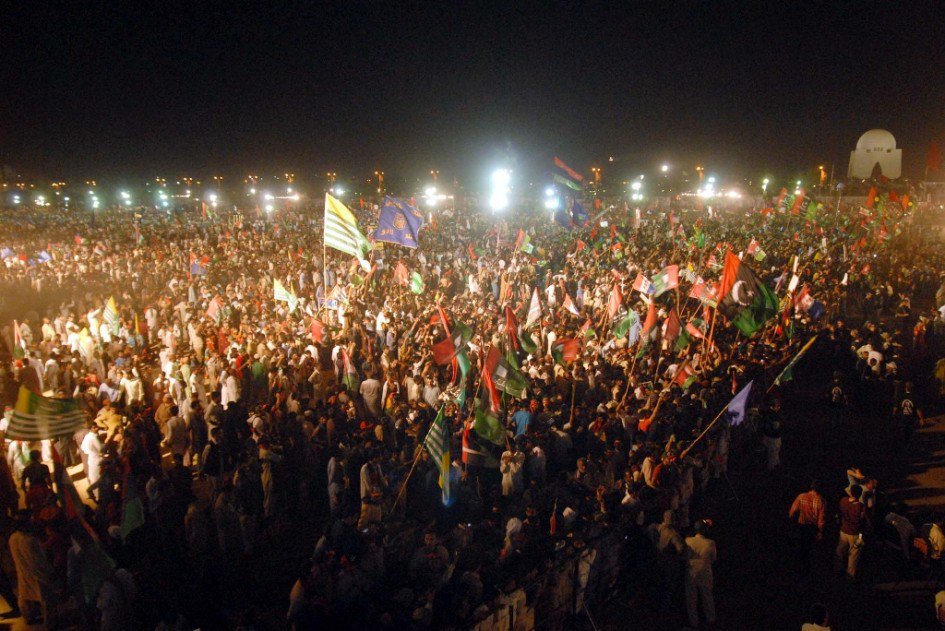
The incumbent National Assembly and provincial assemblies are set to complete their five-year tenures this month. Prior to the general elections, the port city is expected to see numerous big and small political gatherings. Deciding the venue and time for public meetings may result in conflicts in the future similar to what was witnessed between the PPP and PTI. To avoid such untoward incidents, there should be clear laws that govern the public gatherings of political parties.
When The Express Tribune tried to inquire into whether there were any laws that laid down the procedure for the political parties to obtain permissions to hold public meetings, a surprising fact was exposed that there was no bylaw under which political parties sought permissions to hold their public meetings.
To hold public meetings, a conventional procedure is followed that dates back to the British era, according to which a deputy commissioner (DC) exercises his administrative powers to issue a no objection certificate (NOC) to the political parties.
Advocate Muhammad Nadeem Shaikh of the Justice Helpline explained that political parties are issued NOCs by districts' administration to hold public gatherings. "There is no particular law for this," he said.
Earlier in the British rule, district magistrates used to have magisterial powers, under which they granted permissions to hold such gatherings, Advocate Shaikh said, adding that now the DCs, devoid of magisterial powers, exercise their administrative powers to do so.
IN A SORRY STATE : CM feels sorry for Karachi
Requesting anonymity, an official of the commissioner office told The Express Tribune that a DC does not directly grant the NOC. "The DC has to forward the application to the district's SSP for security clearance," the official said.
Once, the SSPs receives the application, they seek intelligence report from the SHO or DSP of the police station concerned and if the report does not indicate any potential threat, the SSPs give a go-ahead to the DCs, the official said. He added that after getting clearance from the police, the DC office then coordinates with authorities that own the venues where the public meetings have been requested.
The ownership of grounds where such gatherings take place lies with different landowning agencies. In Karachi, such agencies include the Karachi Development Authority, Karachi Metropolitan Corporation, Pakistan Railways and cantonment boards. "Once the landowning agency grants the permission, the NOC is issued," the official explained.
He maintained that exercising their influence, the political parties' representatives usually manage to get the security clearance. However, in the current political scenario, obtaining a security clearance may not be easy, the official added.
On paper
The permission to hold public gatherings is always subjected to certain conditions. The most important condition is that the public gathering should not cause obstruction and disturbance to general public and traffic by obstructing any main road.
Bilawal likens Imran to Altaf, challenges him to contest polls from Karachi
To this, Advocate Shaikh commented that when political parties hold public gatherings on Liaquatabad flyover and other major thoroughfares of the city, they violate the Section 339 of the Pakistan Penal Code which deals with wrongful restraint. "Whoever voluntarily obstructs any person so as to prevent that person from proceeding in any direction in which that person has a right to proceed, is said wrongfully to restrain that person," the section reads.
The other conditions include no activity or speech that may fuel sectarian hatred or hurt feelings of the people. The NOC also requires political parties to ensure that no speech is made against the ideology of Pakistan. The parties are also not allowed to burn effigies and flags of any political or religious party. A complete ban on the display of arms is also one of the conditions for issuing the NOC.
In case any mishap occurs at the public gathering, the organiser is deemed responsible for it and has to face the legal consequences.
The permit holder is also bound to abide by the orders of administration and other law enforcement agencies. The organiser is also personally responsible to ensure that the timings are strictly adhered to. Use of deck, speakers and sound amplifiers must comply with the provisions of the West Pakistan Amplifier Ordinance, 1965.
The NOC is also liable to be cancelled anytime without assigning any reason and without prior notice.
In practice
When asked whether the political parties met the conditions of the NOC during their public event, Advocate Shaikh replied in the negative. The DCs succumb to the fear of transfer when it comes to the implementations of these conditions, he said.
After PPP-PTI battle over venue, Bilawal surrenders to Imran for ‘peace in Karachi’
The official of the commissioner office, however, maintained that political parties usually complied with the conditions. Usually, untoward incidents do not take place at public gatherings, he claimed.
Few weeks ago, there was a dispute over a date between the PPP and Muhajir Qaumi Movement - Haqiqi (MQM-H) for their public gatherings in Liaquatabad, the official said. "The PPP wanted to hold the gathering in Tanki Ground, whereas, MQM-H was willing to hold its gathering on Liaquatabad flyover," he explained, adding that it was very difficult to handle the two political meetings in the same area so they requested MQM-H chief Afaq Ahmed to postpone their gathering and the issue was resolved amicably.
1718870162-0/BeFunky-collage-(60)1718870162-0-405x300.webp)
1730504285-0/Martha-(1)1730504285-0-165x106.webp)















COMMENTS
Comments are moderated and generally will be posted if they are on-topic and not abusive.
For more information, please see our Comments FAQ